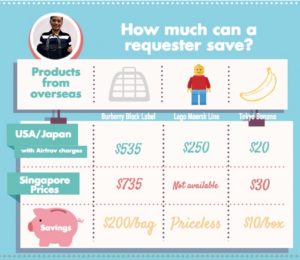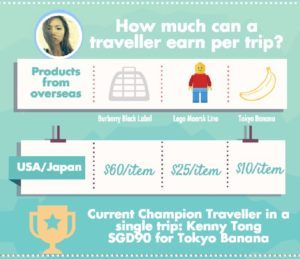Here’s How to Buy Anything from Anywhere (Without Shipping Costs!)

Airfrov, a Singapore-based tech startup, has developed a platform that enables shoppers to buy anything from anywhere by connecting them to Airfrov-registered travellers.
International travel is a Singaporean pastime. Based on Visa’s Global Travel Intentions Study 2015, 95% of Singaporeans have travelled abroad for leisure in 2013 and 2014, higher than the Asia Pacific (84%) and global averages (76%)[1]. Coupled with our other favourite pastime, shopping, the world has become Singaporeans’ shopping mall. Singaporeans often go overseas equipped with a long shopping list of items that are either a) more expensive locally (e.g. a Chanel bag from France), or b) not available locally (e.g. a limited-edition Starbucks mug from Seattle).
A peculiar (and arguably poor) habit has evolved from this. To circumvent hefty shipping costs, Singaporeans impose their shopping lists on others, with 80% of shoppers relying on friends or family to purchase products that might be cheaper or available exclusively in a particular country[2]. This social obligation has inconvenienced travellers, especially those who are on a tight schedule.
Airfrov, a Singapore-based tech startup, has developed a platform to address this problem. Airfrov enables shoppers to get items from around the world by connecting them to an Airfrov-registered traveller.
As a two-sided marketplace, Airfrov has two customers: requesters and travellers. For requesters, the customer promise is to provide access to anything around the world that may not be available/is significantly more expensive locally, without having to pay an exorbitant shipping fee. For travellers, the promise is to help monetize their additional luggage space. An underlying promise to both customers is that Airfrov transactions will be fraud-free.
How this works is that shoppers would post product details, the country, and their willingness to pay on Airfrov’s platform. A request would be accepted by an Airfrov-registered traveller. To protect both its customers, the shopper would have to a pay a deposit (to be held in escrow by Airfrov) once the request has been accepted by the traveller. The higher the willingness to pay over-and-above the retail price, the faster the request will get picked up. Airfrov generates revenue by charging a service fee of 7% + S$2 per transaction. Both requesters and travellers can rate their counterparties after the transaction.

Figure 1: How Airfrov works[3]

Figure 2: Illustration of potential savings for a requester by using Airfrov[4]

Figure 3: Illustration of potential earnings for a traveller by using Airfrov[5]
This nascent platform raised seed funding early this year, and has been doubling its user base every quarter since its launch in March 2015[6], and has expanded its presence from Singapore to the region.
As with any new disruptive service, of course, Airfrov is not immune to potential regulatory setbacks. For instance, Singapore levies a goods and services tax (GST) of 7% on all goods brought into the country, with exemptions only for goods valued only up to S$600 (US$430).
In comparison with other businesses that leverage on a sharing economy, what I find particularly interesting is its potential to infringe on (the verdict is not out on whether it has effectively disrupted) businesses across several industries. Previously, a requester would turn to an online marketplace, such as eBay, to purchase an item that was not available locally. Airfrov infringes on two different industries here – the online marketplace, as well as the fulfillment and logistics providers. It intrigues me that Airfrov seems to be “disrupting the disruptor” of retail (i.e. online marketplaces), shifting some of the consumption in this space back to brick and mortar stores.
I think Airfrov also has the potential to reshape shoppers’ behaviour. A recommendation that I propose would be for travellers to list the items they intend to buy overseas on Airfrov. Rather than only visiting Airfrov when a requester needs an item, requesters can now turn to Airfrov as an alternate shopping platform. If implemented successfully, a Airfrov-registered traveler becomes a one-stop solution for both the purchase and the fulfillment of a product, as opposed to being traditionally done by two parties (e.g. buying a product on eBay but transportation being fulfilled by DHL).
There is also potential to replicate this model in international markets. For instance, this model can leverage on the varying tax rates across the different states in the USA to connect requesters and travellers (barring no regulatory push back). Given the low barriers to entry, the challenge now for Airfrov is to get as many users onto their platform in the quickest time possible. (790 words)
[1] “Singaporeans Travel More Than Regional and Global Counterparts”, Visa Global Travel Intentions Study 2015. http://www.visa.com.sg/aboutvisa/mediacenter/NR_SGP_270815.html
[2] “Here’s How to Earn Extra while you Travel”, CNBC, 18 Jun 2015. http://www.cnbc.com/2015/06/18/earn-extra-while-you-travel-with-airfrov.html
[3] Airfrov website. https://www.airfrov.com/how-it-works
[4] “Singapore-based platform Airfrov helps you buy overseas brands without shipping costs”, Vulcan Post, 2015. https://vulcanpost.com/232531/airfrov-singapore-based-platform-overseas-shopping/
[5] “Singapore-based platform Airfrov helps you buy overseas brands without shipping costs”, Vulcan Post, 2015. https://vulcanpost.com/232531/airfrov-singapore-based-platform-overseas-shopping/
[6] Startup tapping travellers to bring you stuff from abroad raises seed funding”, Tech in Asia, 1 Mar 2016. https://www.techinasia.com/airfrov-seed-funding



Thanks for an interesting post Amelia!
Is there any push back from retailers in Singapore? I know the US has laws against this sort of practice as well (buying things in one country on behalf of someone else in another country), so I imagine Airfrov will come under target from regulatory agencies like the US Customs and Border Protection.
I like your idea of having the travellers buy items and post them on the platform. Basically, the platform would provide travellers with information on which products are in demand and provide the most revenue to the traveler. This would be similar to the “God View” that Uber has. One problem is limited product variety, as I imagine most products will be purchased at an airport rather than at a local shopping mall. What incentivizes the traveler to spend more time hunting for deals in order to offer products at the most appealing price point?
Amelia – great article! I found this business to be very appealing and timely to the needs of Singaporeans. However, how sustainable is this business model? Yes, it is digitally-based and can adapt quickly, but at what point will prices become more on par with each other? Will this be in the near future? If so, travelers may not have as much incentive to go through the hassle of acquiring an item for a requester. The margins will be quite slim and may not appeal to someone who can afford to travel around the world. At some point, maybe your recommendation can kick in, where the traveler dictates the terms versus the requester.
Thanks for a great post Amelia I think the challenge that Airfrov faces is one of scale and market size. I have a hard time imagining this becoming a business with billions or even hundreds of millions of revenue. Perhaps I underestimate the appetite of high-end consumers for truly unique items that can only be obtained outside their home market, but I think this model may only work for “long tail” geographies. In big markets like the United States, selection tends to be broader and thus a lesser need for this type of service.
Nonetheless, I would be very happy to be able to access unique goods from abroad and hope they make their way stateside!
I agree with Vincent – I have a hard time believing that consumers’ willingness to pay for items is so high that they are willing to pay enough of a premium for Airfrov to make decent revenue. I also question whether this business model is sustainable as markets keep opening up – I feel like the issue of access will continue to diminish. To counter these issues, I like your idea of Airfrov creating a marketplace. However, I do wonder if they have the economies of scale to do this more profitably than Amazon or Taobao.
Interesting post, while this model has a lot of potential I would be very hesitant to invest because I this legislation will quickly close the gap on this business model, especially internationally. This model bypasses commercial import taxes and tariffs and if the market grows for Airfrov, I would worry that government organizations will want to ensure that their piece of the pie is preserved. This model is a great example of increasing the utilization of traveler’s space and is a basically risk-free model from Airfrov’s perspective since there is no major up front investment compared to any other transportation or logistics company. I look forward to seeing how this model does moving forward and how legislation reacts as it begins to gain momentum.
I agree with Vincent that this model brings up questions around scale. In order for the company to grow and for customers to get the products they’re looking for (meaning travelers going to places where goods are available and willing to go source the right items while there), they’ll need to grow their customer base to a critical mass. I imagine, however, that if millions of people start using the service, governments are likely to take note and start to question how much tax/import revenue they’re missing out on here!
I don’t have a lot of details on how the economics here work, but I also have questions around how price competitive this model will turn out to be in the long run. It looks like here that a customer bringing items into Singapore is to be charged a 7% goods and services tax, and through Airfrov they pay a 7% service fee. In the case of items not offered at all in Singapore, that may still be a great deal because you don’t have an alternative source to access the product locally. I do wonder, however, if over time competitors might be able to figure out what sort of items are most in demand and import them in a more systematic (and legal!) way. If these items became locally available at reasonable prices, what sort of incentive would there be to ask a stranger to buy them for you abroad?
Thanks for this Amelia! I find the Airfrov business model somewhat unconvincing. I can’t imagine another place on Earth where this business model will work other than Singapore. Take Abercrombie & Fitch for example. The price differential between Abercrombie & Fitch products in the USA vs. UK is the same as the exchange rate i.e. a top for £10 in London will cost $10 in New York. Apple products are equivalently priced. Now, if I pay someone who is in NYC to bring me back an A&F top or an iPhone, they surely have to declare it to customs as bringing in goods for someone else or selling imported goods to them if they are not? I think in a globalised free market world that the difference in price between equivalent products in different jurisdictions is simply as a result of different taxes i.e. given transparent pricing a rational consumer would purchase a product abroad and have it delivered if the cost saving justified the inconvenience and shipping costs and I don’t see how Airfrov could offer a better service given they are not getting wholesale prices and are taking some commission for the service.
Interesting post Amelia! As others have said, I am too a bit skeptical on the sustainability of this business, from a regulatory perspective. I can easily imagine travelers trying to get away with bringing the goods in undeclared to try and maximize their profits, and creating a big problem.
Also, the process of having to actually go to a store and purchase the goods during the traveler’s free time creates a lot of risks too. What if the traveler suddenly couldn’t make the time for the purchase, or couldn’t find the exact item? The risk of non-deliveries can be quite high. One solution of this could be, to have Airfrov be an intermediary and have the goods be pre-ordered online and sent to the the traveler’s hotel (or call the store to have them hold on to product for pick up on a certain date) , so they can mitigate this risk. In doing so, your market for travelers expands greatly by capturing the travelers with a tighter schedule, which can help in scaling the business.